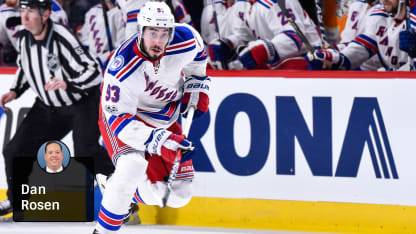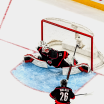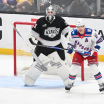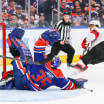NEW YORK --The Mika Zibanejad who was dominating on the puck, skating and creating for himself and others in Game 3 of the Eastern Conference Second Round against the Ottawa Senators on Tuesday, is the Mika Zibanejad the New York Rangers need to see more of in the 2017 Stanley Cup Playoffs and beyond.
The problem is nobody, least of all Zibanejad, can say with any degree of certainty it will happen.
Rangers need Mika Zibanejad to figure it out
Center must continue to stay aggressive in Game 4 against Senators

It's more of a mental issue than a physical one for the 24-year-old center, who said he is guilty of being too passive and too safe too often, that he worries about making mistakes instead of living with them and staying aggressive.
If Zibanejad can find a way to break out of the mental block that has dogged him throughout his NHL career, he'll undoubtedly continue to help the Rangers come back in their series against Ottawa and potentially go all the way.
New York trails the best-of-7 series 2-1 after winning 4-1 in Game 3 on Tuesday. Game 4 is at Madison Square Garden on Thursday (7:30 p.m. ET; NBCSN, CBC, TVA Sports).
\[RELATED: Complete Senators vs. Rangers series coverage\]
"We're going to be sitting here in a couple of years probably saying, 'He was a real good player' or we're going to say, 'He never quite figured it out,'" Rangers coach Alain Vigneault said of Zibanejad. "That's part of him working at his game, working at his mental game, working with our sports psychologist trying to put it all together."
Zibanejad put it all together in Game 3 at the Garden, where he was arguably the best forward, if not player, on the ice for either team.
He had an assist, a game-high six shots on goal, 10 total shot attempts and three hits. Zibanejad even created a breakaway for himself at 15:41 of the first period by beating three Ottawa players with his own chip and chase pass to himself.
"There's a lot of players that have a tremendous amount of skillset, but you always have to combine that with the right work ethic and the right attitude," Vigneault said. "You have to develop your skills, not just the on-ice skills but the off-ice skills that separate good players from really good players. I think Mika is starting to grasp that."
Zibanejad's performance in Game 3 was arguably his best since Jan. 17, when he scored two goals in his return from a leg injury that cost him 25 games.
"I think the battle level was good," Zibanejad said. "I think [I was] skating a lot more. I think that's something that's been growing through the playoffs. Not thinking too much, just playing on my instinct. It's so easy for me to say that and it's a lot harder to do, obviously."
Yes, obviously.
Zibanejad's inconsistency isn't new. It might be the reason Ottawa traded him to the Rangers, along with a second-round pick in the 2018 NHL Draft for center Derick Brassard and a 2018 seventh-round pick, on July 18.
The Senators may just have seen enough from Zibanejad to just say when.
They selected him with the No. 6 pick in the 2011 draft. They put time into developing him, but he'd be terrific for a handful of games and disappear for the next handful.
For example, last season Zibanejad had a chance to be Ottawa's No. 1 center when Kyle Turris was playing on a high ankle sprain before he eventually had to be shut down for the season on Feb. 27. Zibanejad never took command of the role and eventually the Senators gave the job to Jean-Gabriel Pageau.
Zibanejad got off to a good start with the Rangers this season with 15 points (five goals, 10 assists) in 19 games before he broke his leg in a game against the Florida Panthers on Nov. 20. He was not the same player upon returning. He had 22 points (nine goals, 13 assists) in his last 37 regular-season games, including seven (one goal, six assists) in 19 games from Jan. 19-March 4.
Then came the postseason. Zibanejad had one point, an assist, and was ineffective in the first three games of New York's first-round series against the Montreal Canadiens. He wasn't generating enough scoring chances. He wasn't physical. He was kind of just there.
He spoke before Game 4 of that series about how he wasn't being aggressive, that he wasn't skating and as a result he wasn't hard to defend. These were the same problems he had in the regular season.
"It's still a question for me why I'm doing it," Zibanejad said. "I don't know what the argument would be, but it's just too safe. That's not the player I should be or I am. It's something I'm trying to work on."
His work seems to be paying off. Zibanejad has been better since Game 4 against the Canadiens. He scored the overtime winner in Game 5. He had an assist on the first of two goals by forward Mats Zuccarello in the Rangers' series-clinching 3-1 win in Game 6.
He was so-so in Game 1 against Ottawa but more assertive in Game 2, when he had two assists after Vigneault moved Zuccarello onto his line with Chris Kreider.
It was all building to his performance Tuesday, when he was too much for Ottawa to handle, especially in the first period.
"Just personally, I think [it was] probably the best first period I've played," Zibanejad said. "I don't know about 60 minutes, but it's heading toward the right direction."
Too often in his NHL career Zibanejad has made a wrong turn at this exact moment. Maybe this is the time he stays straight.
"We need that," Vigneault said.

















